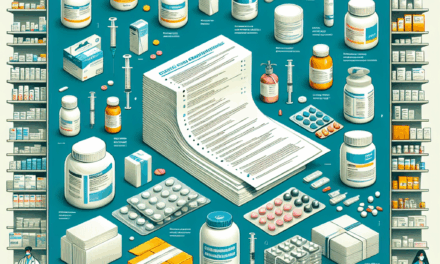The Modernization of RCM Companies: A Necessity for Progress
Revenue Cycle Management (RCM) is a critical component of the healthcare industry, encompassing the processes that healthcare providers use to track patient care episodes from registration and appointment scheduling to the final payment of a balance. As the healthcare landscape evolves, RCM companies must modernize their operations to keep pace with technological advancements, regulatory changes, and shifting patient expectations. This article explores the necessity of modernization in RCM companies, focusing on five key areas: technology integration, data analytics, regulatory compliance, patient engagement, and workforce development.
1. Technology Integration: The Backbone of Modern RCM
In the digital age, technology integration is paramount for RCM companies. The healthcare sector is increasingly reliant on advanced technologies to streamline operations, enhance accuracy, and improve patient experiences. Modern RCM companies are adopting various technologies, including Electronic Health Records (EHR), cloud computing, and artificial intelligence (AI).
One of the most significant advancements in RCM is the integration of EHR systems. These systems allow for seamless data sharing between healthcare providers, insurers, and patients. By centralizing patient information, EHRs reduce the likelihood of errors and improve the efficiency of billing processes. For instance, a study by the Office of the National Coordinator for Health Information Technology found that EHR adoption has led to a 10% reduction in billing errors.
Cloud computing is another technology that has transformed RCM. By utilizing cloud-based solutions, RCM companies can store vast amounts of data securely while ensuring easy access for authorized personnel. This flexibility allows for real-time updates and collaboration among healthcare teams, which is essential for effective revenue cycle management.
Artificial intelligence is also making waves in RCM. AI algorithms can analyze vast datasets to identify patterns and predict outcomes, enabling RCM companies to optimize their processes. For example, AI can automate claims processing, reducing the time it takes to submit and receive payments. According to a report by McKinsey, AI can improve claims processing efficiency by up to 30%.
- Integration of EHR systems for seamless data sharing
- Cloud computing for secure and flexible data storage
- AI for automating claims processing and predicting outcomes
In conclusion, technology integration is not just an option but a necessity for RCM companies aiming to enhance their operational efficiency and improve patient care. As technology continues to evolve, RCM companies must stay ahead of the curve to remain competitive.
2. Data Analytics: Driving Informed Decision-Making
Data analytics has emerged as a powerful tool for RCM companies, enabling them to make informed decisions based on real-time data. The ability to analyze financial and operational data allows RCM companies to identify trends, forecast revenue, and optimize their processes.
One of the primary benefits of data analytics in RCM is the ability to track key performance indicators (KPIs). By monitoring KPIs such as days in accounts receivable, claim denial rates, and patient payment trends, RCM companies can gain insights into their performance and identify areas for improvement. For instance, a study by the Healthcare Financial Management Association found that organizations that actively monitor KPIs can reduce their days in accounts receivable by up to 20%.
Predictive analytics is another area where RCM companies can leverage data. By analyzing historical data, RCM companies can predict future trends and make proactive decisions. For example, predictive analytics can help identify patients who are likely to default on payments, allowing RCM companies to implement targeted interventions to improve collections.
Moreover, data analytics can enhance revenue integrity by identifying billing discrepancies and ensuring compliance with regulations. By utilizing data analytics tools, RCM companies can conduct audits and identify potential issues before they escalate into costly problems.
- Tracking KPIs for performance improvement
- Utilizing predictive analytics for proactive decision-making
- Enhancing revenue integrity through data audits
In summary, data analytics is a game-changer for RCM companies. By harnessing the power of data, RCM companies can drive informed decision-making, improve operational efficiency, and ultimately enhance revenue collection.
3. Regulatory Compliance: Navigating a Complex Landscape
The healthcare industry is subject to a myriad of regulations, making compliance a critical focus for RCM companies. As regulations evolve, RCM companies must modernize their compliance strategies to mitigate risks and avoid costly penalties.
One of the most significant regulatory frameworks affecting RCM is the Health Insurance Portability and Accountability Act (HIPAA). HIPAA mandates strict guidelines for protecting patient information, and non-compliance can result in hefty fines. RCM companies must implement robust security measures to safeguard patient data, including encryption, access controls, and regular audits.
Additionally, the transition to value-based care has introduced new compliance challenges for RCM companies. Under value-based care models, providers are incentivized to deliver high-quality care while managing costs. RCM companies must ensure that their billing practices align with these new models, which often require more detailed documentation and reporting.
To navigate the complex regulatory landscape, RCM companies are increasingly turning to compliance management software. These tools help automate compliance processes, track regulatory changes, and ensure that all staff are trained on compliance requirements. For example, a survey by the American Health Information Management Association found that organizations using compliance management software reported a 25% reduction in compliance-related incidents.
- Understanding and adhering to HIPAA regulations
- Aligning billing practices with value-based care models
- Utilizing compliance management software for automation
In conclusion, regulatory compliance is a critical aspect of RCM modernization. By adopting proactive compliance strategies and leveraging technology, RCM companies can mitigate risks and ensure adherence to evolving regulations.
4. Patient Engagement: Enhancing the Patient Experience
In today’s healthcare environment, patient engagement is more important than ever. Patients are increasingly taking an active role in their healthcare decisions, and RCM companies must modernize their approaches to meet these changing expectations.
One of the key components of patient engagement is effective communication. RCM companies must ensure that patients are informed about their financial responsibilities and billing processes. This can be achieved through clear and transparent billing statements, as well as proactive communication regarding payment options and financial assistance programs.
Moreover, technology plays a crucial role in enhancing patient engagement. Many RCM companies are adopting patient portals that allow patients to access their billing information, make payments online, and communicate with billing representatives. According to a survey by the Healthcare Financial Management Association, organizations that implemented patient portals saw a 15% increase in patient satisfaction scores.
Additionally, RCM companies can leverage mobile applications to enhance patient engagement. Mobile apps can provide patients with reminders for upcoming payments, educational resources about their financial responsibilities, and easy access to customer support. By offering these tools, RCM companies can empower patients to take control of their healthcare finances.
- Ensuring clear communication about financial responsibilities
- Implementing patient portals for easy access to billing information
- Leveraging mobile applications to enhance engagement
In summary, patient engagement is a critical aspect of RCM modernization. By prioritizing communication and leveraging technology, RCM companies can enhance the patient experience and improve overall satisfaction.
5. Workforce Development: Building a Skilled Team
The success of RCM companies hinges on the skills and expertise of their workforce. As the industry evolves, RCM companies must invest in workforce development to ensure that their teams are equipped to handle the complexities of modern revenue cycle management.
One of the primary areas of focus for workforce development is training. RCM companies must provide ongoing training to their staff to keep them informed about the latest regulations, technologies, and best practices. This can include formal training programs, workshops, and online courses. For example, organizations that invest in employee training report a 24% higher profit margin compared to those that do not.
Additionally, RCM companies should foster a culture of continuous learning. Encouraging employees to pursue professional certifications and attend industry conferences can enhance their skills and knowledge. Certifications such as Certified Revenue Cycle Specialist (CRCS) and Certified Professional Coder (CPC) can provide employees with valuable credentials that benefit both the individual and the organization.
Moreover, RCM companies must prioritize employee well-being and job satisfaction. A positive work environment can lead to higher employee retention rates and improved productivity. Implementing flexible work arrangements, offering competitive compensation packages, and recognizing employee achievements are all strategies that can enhance workforce morale.
- Providing ongoing training and education for staff
- Encouraging professional certifications and continuous learning
- Fostering a positive work environment for employee satisfaction
In conclusion, workforce development is a critical component of RCM modernization. By investing in their teams, RCM companies can enhance their operational efficiency and improve overall performance.
Conclusion: Embracing Modernization for Future Success
The modernization of RCM companies is not just a trend; it is a necessity for progress in the ever-evolving healthcare landscape. By focusing on technology integration, data analytics, regulatory compliance, patient engagement, and workforce development, RCM companies can enhance their operational efficiency, improve patient experiences, and drive revenue growth.
As the healthcare industry continues to change, RCM companies must embrace modernization to remain competitive and meet the needs of patients and providers alike. By prioritizing these key areas, RCM companies can position themselves for success in the future.





